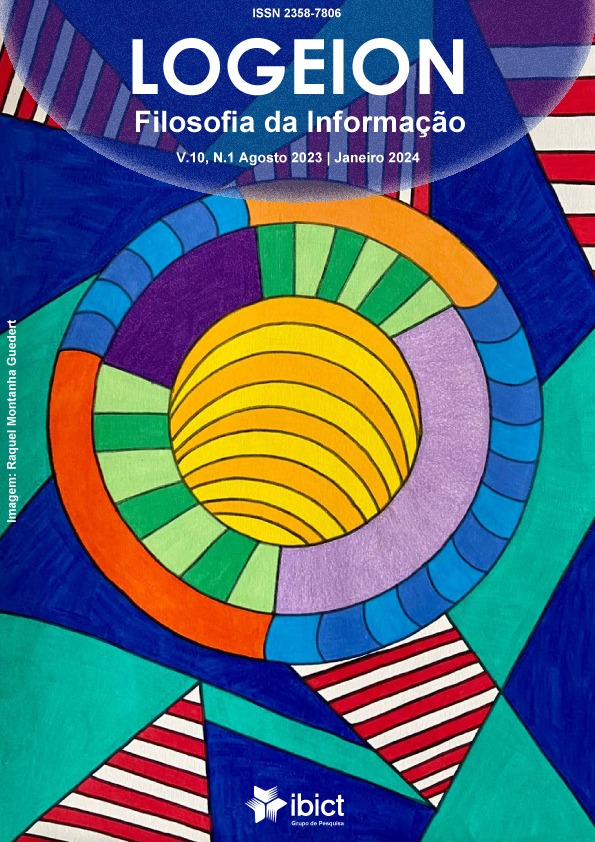The role of criticality thinking for the construction of emancipatory narratives and anti-monuments of memory
DOI:
https://doi.org/10.21728/logeion.2023v10n1.p62-74Keywords:
Critical theory, Criticality, Antimonuments, MemoryAbstract
Scientific theories build a set of arguments to understand phenomena in the world, understanding actions and making predictions based on significant connections. From the movement of reflection with epistemologies that question the hegemonic western science project with the objective of thinking about the sense of criticism in the construction of antimonuments of memory. The research will be configured as follows: regarding the exploratory objectives, using bibliographic research as theoretical support; as for the nature of the data, the research is characterized as qualitative. The work is presented from an epistemological and positioned focus, reflecting the link between science/academy, knowledge production and political practice. It tensions the main concepts about antimonuments, critical theory and memory, in addition to case contextualization. There is a connection between rationality, criticality and the construction of anti-memory monuments to enable and enhance an emancipatory narrative.
Downloads
References
ALMEIDA, S. Se configura "anacronismo" falar da violência dos bandeirantes contra negros e indígenas porque "o tempo era outro", então não podemos também olhar criticamente para o nazismo, o colonialismo e para a segregação racial. 01, ago., 2021. Twitter: @silviolual. Disponível em: https://twitter.com/silviolual/status/1421990224209526789 . Acesso em: 24 nov. 2021.
ASSMANN, J. Freud, a religião e a memória cultural. Deutsche Welle . 2006. Disponível em: http://www.dw-world.de/dw/article/0,,1947328,00.html. Acesso em: 21 abr. 2023.
BEZERRA, A. C. Contribuição da Teoria Crítica aos estudos sobre regime de informação e competência crítica em informação. In: ENCONTRO NACIONAL DE PESQUISA EM CIÊNCIA DA INFORMAÇÃO – ENANCIB, 19., 2018, Londrina. Anais [...]. Disponível em: http://enancib.marilia.unesp.br/index.php/XIX_ENANCIB/xixenancib/paper/view/1354/1840. Acesso em: 24 nov. 2021.
CHAUÍ, M. Convite à filosofia. 13a. ed. São Paulo: Ática, 2003
COSTA, M. M. da G. Lugares de memória do bairro de Santo Amaro: a estátua de Borba Gato. Dissertação (Dissertação em Ciências Humanas) - Universidade de Santo Amaro, São Paulo. 2017. Disponível em: https://dspace.unisa.br/server/api/core/bitstreams/b9088eaa-6580-4dee-b29f-aa17eb8361db/content. Acesso em: 24 nov. 2021.
ERLL, A. Memoria colectiva y culturas del recuerdo. Bogotá: Universidad de los Andes, Ediciones Unianes, 2012.
FONSECA, J. J. S. Metodologia da pesquisa científica. Fortaleza: UEC, 2002.
FREIRE, P. Pedagogia do oprimido. São Paulo: Instituto Paulo Freire, 1968.
GREEN, J. N. “Abaixo a repressão, mais amor e mais tesão”: uma memória sobre a ditadura e o movimento de gays e lésbicas de São Paulo na época da abertura. Acervo. Revista do Arquivo Nacional, v. 27, n. 1, p. 53-82, 2014. Disponível em: http://hdl.handle.net/20.500.11959/brapci/44155. Acesso em: 21 abr. 2023.
HARAWAY, D. Saberes localizados: a questão da ciência para o feminismo e o privilégio da perspectiva parcial. Cadernos Pagu, v. 5, p. 7-42, 1995. Disponível em: https://periodicos.sbu.unicamp.br/ojs/index.php/cadpagu/article/view/1773. Acesso em 07 jan. 2022..
HARDING, S. Del problema de la mujer em la ciência al problema de la ciência em el feminismo. In: Ciencia y Feminismo. Madrid: Ediciones Morata, 2016. p. 15-27. Disponível em: https://edmorata.es/wp-content/uploads/2020/06/Harding.CienciaFeminismo.PR_.pdf. Acesso em 10 jan. 2022..
HOOKS, B. Ensinando pensamento crítico: sabedoria prática. São Paulo: Ed. Elefante, 2020.
HOOKS, B. Ensinando a transgredir: a educação como prática da liberdade. São Paulo: WMF Martins Fontes, 2020.
KANT, I. Critique of pure reason (1781). In: GUYER, Paul, Wood; Allen W. (eds.). Critique of purê reason. Cambridge, MA: Houghton Mifflin, p. 370-456, 1998. Disponível em: http://200.19.248.10:8002/professores/evandrogodoy/Estudos%20Kant/kant-first-critique-cambridge.pdf. Acesso em: 7 jan. 2022.
LE GOFF, J. História e memória. Campinas: Ed. da UNICAMP, 1990. Disponível em: https:// https://www.ufrb.edu.br/ppgcom/images/História-e-Memória.pdf. Acesso em: 21 abr. 2023.
MACHADO, L. C. S. A Releitura Sígnica de uma Memória Traumática: o Museu de Auschwitz-Birkenau. In: Congresso Brasileiro de Ciências da Comunicação, 39. Anais [...] São Paulo, 2016. Disponível em:https://www.portalintercom.org.br/anais/nacional2016/resumos/R11-2497-1.pdf. Acesso em: 20 abr. 2023.
MOMBAÇA, Jota. O mundo é meu trauma. Piseagrama, Belo Horizonte, n. 11, p. 20-25, nov. 2017. Disponível em: https://piseagrama.org/artigos/o-mundo-e-meu-trauma/. Acesso em 25 ago. 2023.
NOBRE, M. A teoria crítica. Editora Schwarcz-Companhia das Letras, 2004.
PINTO, D. M. Consciência e memória. São Paulo: Editora WMF Martins Fontes, 2013.
RIEGL, A. O culto moderno dos monumentos: a sua essência e a sua origem. Tradução de Werner Rothschild Davidsohn e Anat Falbel. São Paulo: Perspectiva, 2014.
SELIGMANN-SILVA, Márcio. Por uma estética do precário: antimonumentos e a arte de ‘desesquecer’. Fórum Permanente, 2016. Disponível em: http://www.forumpermanente.org/revista/numero-7/conteudo/politicas-do-esquecimento/por-uma-estetica-do-precario-antimonumentos-e-a-arte-de-2018desesquecer2019. Acesso em: 25 nov. 2021.
Downloads
Published
Issue
Section
License
Copyright (c) 2023 Logeion: Filosofia da Informação

This work is licensed under a Creative Commons Attribution-NonCommercial-ShareAlike 4.0 International License.
The journal is published under the Creative Commons - Attribution - Noncommercial - Share Alike 3.0 Brazil.
The published work is considered collaboration and therefore the author will not receive any remuneration for this as well as anything will be charged in exchange for publication.
All texts are responsibility of the authors.
It’s allowed partial or total reproduction of the texts of the magazine since the source is cited.














